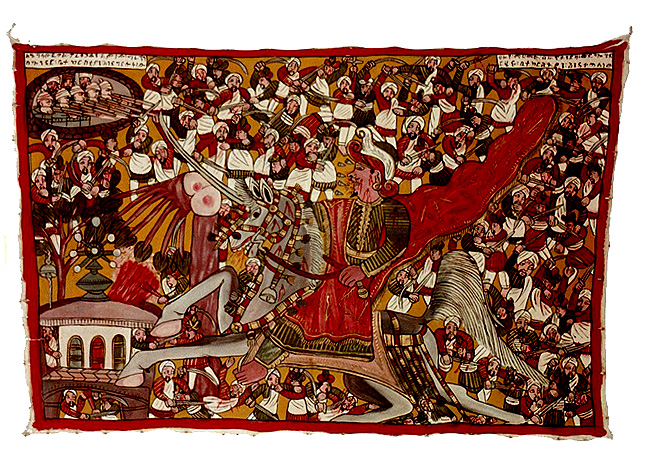
The dry sirocco wind whistles over the vast Sahara wastes. It is the wind of change...
Immense camel caravans carry the treasures of the Orient south over the desert. But where they once made for legendary Audagost, now they head for Djenné, Gao, or Katsina - new trading centres where fortunes may be won and lost. In West Africa, in the lands of the mighty river Niger, the ancient mercantile empire of Ghana falters, and Mali, Songhai, and others vie for control of the trade routes and the unimaginable wealth they promise.
The dry sirocco wind whistles over the vast Sahara wastes. It is the wind of change...
The peace of Lake Chad and the boundless savannahs of the centre of the continent is shattered by the harsh trumpets of a new power. The petty chieftaincies that have dominated the lives of thousands for centuries are growing, merging, coalescing, into great kingdoms. The feared cavalry of the ruthless Kanem-Bornu empire wheel across the plains, bringing the faith of the Prophet on the point of a spear. Can anything stop their bloodthirsty expansion and fanaticism?
The dry sirocco wind whistles over the vast Sahara wastes. It is the wind of change...
Where once pharaohs sailed up the eternal Nile and armies of slaves laboured to build the greatest monuments of antiquity, new powers, more formidable even than those of ancient Egypt, have emerged. Under the peerless Saladin, the Ayyubid dynasty is establishing itself as the superpower of North Africa. To the south, where the Nubian sun beats down upon the desert plains and where the White Nile meets the Blue, the Christian kingdoms of Makuria and Alwah quake. Can they survive in the face of the mightiest Muslim armies on the planet?
The dry sirocco wind whistles over the vast Sahara wastes. It is the wind of change...
Far to the east, the ancient civilisation of Ethiopia has endured for centuries, outlasting dynasties and empires alike. But now it faces the greatest double crisis in its history. The Muslims of the Red Sea coast are uniting and, under their mysterious left-handed leader, threaten invasion of the Christian empire. Most terrifying of all, a deadly insurrection has broken out, led by Yodit and her Jewish zealots. Can the empire survive this combination of external and internal threats? Can the Ark of the Covenant be kept safe in its mountain home? Or can Yodit lead her freedom fighters to victory and the re-establishment of an African Zion?
It is now - between the years AD 1000 and 1600 - that the fate of North Africa will be decided. As three great religions - Judaism, Christianity, and Islam - meet and clash, great empires will appear, flourish and vanish again like flowers in the desert. You must struggle for control of land, of resources, of the people's affections, and - most of all - of the all-important resources and the trade routes to them. Control the trade routes, and you can become rich and powerful. Lose them to your rivals, and you will wither.

This painting was done by an unknown Ethiopian artist in 1950. It depicts the last battle of the legendary Imam Ahmad ibn Ibrahim al-Ghazi, or "Grañ", the "Left-Handed". In the sixteenth century, Grañ; united the armies of the Adalian sultanate and led them on a holy war against Ethiopia, bringing the empire to its knees and wreaking devastation throughout the country. As the emperor fled before him, Grañ; claimed to be sent by God and to be impervious to bullets, and, it was said, he could chop through the trunk of a tree with a single blow of his immense sword. But at this critical moment, the Portuguese made contact with Ethiopia and came to their rescue with a tiny force of musketeers (depicted in the top left-hand corner of this picture). Grañ, despite his boast, was killed by a Portuguese bullet, and the Christian empire was saved.
Play the scenario and see if you will be so lucky!








 !!
!! )
)

